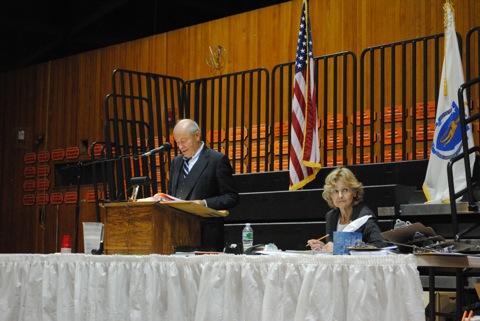Wayland voters approve marijuana moratorium

Credit: Elizabeth Doyon
The town moderator oversees debate on the town meeting floor during a recent town meeting.
January 27, 2018
Wayland voters recently approved a six-month moratorium on the opening of marijuana stores in town. Sarah Greenaway, a sponsor of the moratorium and a member from the Youth Advisory Committee (a town department that supports and oversees the healthy development of young Wayland residents and families), explained the difference in the turnout of the votes on Tuesday, Nov. 14 and the other time she presented this article.
“This town meeting we got the supermajority vote, enough to pass. It was over 500 votes to 90,” Greenaway said. “The first time we won the majority vote but we failed to get the two-thirds supermajority at town meeting.”
A moratorium, which is a temporary prohibition or a refusal to allow things to happen, will allow the Cannabis Control Commission to come out with regulations on marijuana. The Cannabis Control Commission is a group that recently was put together to come up with regulations on how marijuana will be sold and how it will be regulated.
“When the law passed voting to legalize recreational marijuana, our group, the Youth Advisory Committee, considered [whether or not it] was going to impact our town, our families and our youth,” Greenaway said. “[After some consideration], we thought it was worth delaying.”
One concern raised in the debate over the moratorium was the effect of marijuana shops in Wayland on WHS students. Edibles, food laced with marijuana, are one potential way students could be affected. Speaking for her committee, Greenaway discussed the dangers of edibles for students.
“We don’t know if it would impact [the students] but the Youth Advisory Committee is still concerned,” Greenaway said. “One of the big concerns with the pot shops is that there are edibles. Edibles have varied concentrations of levels of THC, which is the active drug in marijuana that is responsible for the high feeling.”
Jason Verhoosky from Wayland Cares gave some interesting insight into how marijuana negatively affects students.
“Marijuana is the most used substance for students,” Verhoosky said. “The more we become accustomed to seeing something the more normal it becomes. It’s not odd to drive by liquor store; liquor has been legal for a long, long time. If we treat marijuana the same way we treat alcohol, which is basically what the law says we should do, then we’re normalizing it and increasing access to it. [And that’s] not saying that it’s not already here.”
Wayland resident and WHS health teacher Rachel Hanks shares Greenaway’s concerns about how conveniently WHS students would be able to access marijuana.
“I just don’t like all the marketing that legalizing marijuana would entail, kind of like tobacco marketing,” Hanks said. “It’s gonna be this huge for-profit business.”
Wayland has to stay under 20% in sales in order to get 3% of the profit because 6.25% will go to the state for sales tax and 10.75% will go to the cannabis control commission.
Some residents believe there are many downsides to having pot shops in town and that there should not be any in Wayland. Hanks believes this could be because bringing marijuana shops to Wayland will make it easier to get the drug.
“I think it’s for convenience,” Hanks said. “[My family] didn’t move to Wayland because it had four liquor stores. It wasn’t like we couldn’t move to a town that didn’t have liquor stores, but for some people that might be an important point.”
There are many reasons to want and to not want pot shops in Wayland. Verhoosky agrees with Greenaway and Hanks.
“Personally, in the perspective of Wayland Cares, we don’t take a stance one way or another,” Verhoosky said. “That being said, [I believe] the harm outweighs the potential for good.”





![Last Wednesday, the Wayland School Committee gathered to discuss a number of topics regarding the health curriculum and Innovation Career Pathway course. Another large topic of conversation was the ways to potentially mitigate distracting cell phone usage. "These [phones] are going to distract your learning and social relationships," Superintendent David Fleishman said. "That's concrete right there."](https://waylandstudentpress.com/wp-content/uploads/2025/06/Screenshot-2025-06-04-at-9.49.31 PM-1200x886.png)



























![Troy Hoyt finishes the Boston Marathon, running for the Hoyt Foundation. T. Hoyt is the son of Hoyt Foundation CEO Russ Hoyt.
“[Running a marathon] might seem like a big thing, when it’s presented to you at first, but if you break it up and just keep telling yourself, “Yes, you can,” you can start chipping away at it. And before you know it, you’ll be running the whole 26 miles, and you won’t even think twice about it.” T. Hoyt said.](https://waylandstudentpress.com/wp-content/uploads/2025/04/C36E8761-1CBB-452E-9DF2-543EF7B1095E_1_105_c.jpeg)














































weed advocate • Jan 28, 2018 at 12:37 PM
Dunno why the old geezers are so against weed. Just saying, marijuana has been scientifically proven to be over 100x safer than alcohol.
Also, it sucks that how ~700 people were able to dictate the outcome of this vote as they represent, based on rough calculations using 2010 census data, only 7% of the town’s eligible voting popular. SAD!